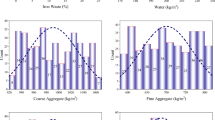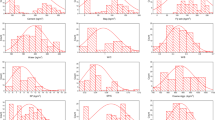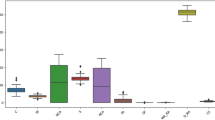Abstract
This study investigates the application of machine learning (ML) models to predict the compressive, flexural, and split tensile strength of concrete incorporating coconut shell as a partial replacement for coarse aggregate. This study utilizes a comprehensive dataset compiled from reputable literature, encompassing various experimental samples and input variables. Statistical analyses, including Pearson correlation and frequency distribution, lay the groundwork for preprocessing, involving standard scaling of features. Five prominent ML models, namely, support vector regression, random forest regression, gradient boosting regression, extreme gradient boosting regression, and multi-layer perceptron regression, are trained on the preprocessed dataset. The models' performances are rigorously evaluated using R2, RMSE, MAE, MAPE, and Comprehensive Performance Index (CPI) metrics. The feature importance analysis unveils the critical role of variables such as the age of concrete, coarse aggregate, and water in sha** concrete strength. gradient boosting regression consistently emerges as the top-performing model. This study concludes with insights into the implications for sustainable construction practices and suggests future research directions, emphasizing the continual refinement of predictive models and on-site validation for real-world applications in construction engineering.










Similar content being viewed by others
Data availability
The dataset will be available upon request to the corresponding author.
References
Almutairi, A. L., Tayeh, B. A., Adesina, A., Isleem, H. F., & Zeyad, A. M. (2021). Potential applications of geopolymer concrete in construction: a review. Case Studies in Construction Materials, 15, e00733. https://doi.org/10.1016/J.CSCM.2021.E00733
Bari, H., Salam, M. A., & Safiuddin, M. (2021). Fresh and hardened properties of brick aggregate concrete including coconut shell as a partial replacement of coarse aggregate. Construction and Building Materials, 297, 123745. https://doi.org/10.1016/J.CONBUILDMAT.2021.123745
Bharatkumar, B. H., Narayanan, R., Raghuprasad, B. K., & Ramachandramurthy, D. S. (2001). Mix proportioning of high performance concrete. Cement and Concrete Composites, 23, 71–80. https://doi.org/10.1016/S0958-9465(00)00071-8
Bhoj, S., Manoj, A., & Bhaskar, S. (2023). Usage potential and benefits of processed coconut shells in concrete as coarse aggregates. Mater Today Proc. https://doi.org/10.1016/J.MATPR.2023.03.529
Breiman, L. (2001). Random forests. Machine Learning, 45, 5–32. https://doi.org/10.1023/A:1010933404324
Chen, T., Guestrin, C., 2016. XGBoost: A scalable tree boosting system, in: Proceedings of the ACM SIGKDD International Conference on Knowledge Discovery and Data Mining. Association for Computing Machinery https://doi.org/10.1145/2939672.2939785
Cirovic, D. A. (1997). Feed-forward artificial neural networks: Applications to spectroscopy. TrAC Trends in Analytical Chemistry, 16, 148–155. https://doi.org/10.1016/S0165-9936(97)00007-1
Cortes, C., & Vapnik, V. (1995). Support-vector networks. Machine Learning, 20, 273–297. https://doi.org/10.1007/bf00994018
Friedman, J. H. (2001). Greedy function approximation: A gradient boosting machine. Annals of Statistics, 29, 1189–1232.
Giergiczny, Z. (2019). Fly ash and slag. Cement and Concrete Research, 124, 105826. https://doi.org/10.1016/J.CEMCONRES.2019.105826
Gunasekaran, K., Kumar, P. S., & Lakshmipathy, M. (2011). Mechanical and bond properties of coconut shell concrete. Construction and Building Materials, 25, 92–98. https://doi.org/10.1016/J.CONBUILDMAT.2010.06.053
Gunasekaran, K., Annadurai, R., & Kumar, P. S. (2013). Study on reinforced lightweight coconut shell concrete beam behavior under flexure. Materials & Design, 1980–2015(46), 157–167. https://doi.org/10.1016/J.MATDES.2012.09.044
Gunasekaran, K., Annadurai, R., & Kumar, P. S. (2015). A study on some durability properties of coconut shell aggregate concrete. Materials and Structures/materiaux Et Constructions, 48, 1253–1264. https://doi.org/10.1617/S11527-013-0230-2/METRICS
Iranmanesh, A., & Kaveh, A. (1999). Structural optimization by gradient-based neural networks. Int J Numer Methods Eng, 46, 297–311.
Itam, Z., Dzar Johar, A., Syamsir, A., Zainoodin, M., Shaikh Ahmad Fadzil, S. M. M., & Beddu, S. (2022). Utilization of coconut shell as a supplementary cementitious material in concrete. Mater Today Proc, 66, 2818–2823. https://doi.org/10.1016/J.MATPR.2022.06.522
Jerlin Regin, J., Vincent, P., Shiny, D.S., Porcia, L., 2019. Neural Network Prediction of Compressive Strength of Lightweight Coconut Shell Concrete. 2019 International Conference on Recent Advances in Energy-Efficient Computing and Communication, ICRAECC 2019. https://doi.org/10.1109/ICRAECC43874.2019.8995134
Kanojia, A., & Jain, S. K. (2017). Performance of coconut shell as coarse aggregate in concrete. Construction and Building Materials, 140, 150–156. https://doi.org/10.1016/J.CONBUILDMAT.2017.02.066
Kaveh, A. (2016). Applications of metaheuristic optimization algorithms in civil engineering. Applications of Metaheuristic Optimization Algorithms in Civil Engineering. https://doi.org/10.1007/978-3-319-48012-1/COVER
Kaveh, A., & Khavaninzadeh, N. (2023). Efficient training of two ANNs using four meta-heuristic algorithms for predicting the FRP strength. Structures, 52, 256–272. https://doi.org/10.1016/J.ISTRUC.2023.03.178
Kaveh, A., & Rahimi Bondarabady, H. A. (2004). Wavefront reduction using graphs, neural networks and genetic algorithm. Int J Numer Methods Eng, 60, 1803–1815. https://doi.org/10.1002/NME.1023
Kaveh, A., Elmieh, R., & Servati, H. (2001). Prediction of moment-rotation characteristic for semi-rigid connections using BP neural networks. Asian Journal of Civil Engineering, 2, 131–142.
Kaveh, A., Dadras Eslamlou, A., Javadi, S. M., & Geran Malek, N. (2021). Machine learning regression approaches for predicting the ultimate buckling load of variable-stiffness composite cylinders. Acta Mechanica, 232, 921–931. https://doi.org/10.1007/S00707-020-02878-2/METRICS
Kaveh, A., Eskandari, A., & Movasat, M. (2023). Buckling resistance prediction of high-strength steel columns using Metaheuristic-trained Artificial Neural Networks. Structures, 56, 104853. https://doi.org/10.1016/J.ISTRUC.2023.07.043
Kaveh, A., Khalegi, A., 1998. Prediction of strength for concrete specimens using artificial neural networks. Advances in engineering computational technology 165–171.
Khan, M. I., & Abbas, Y. M. (2023). Intelligent data-driven compressive strength prediction and optimization of reactive powder concrete using multiple ensemble-based machine learning approach. Construction and Building Materials, 404, 133148. https://doi.org/10.1016/J.CONBUILDMAT.2023.133148
Kumar, V. R. P., Gunasekaran, K., & Shyamala, T. (2019). Characterization study on coconut shell concrete with partial replacement of cement by GGBS. Journal of Building Engineering, 26, 100830. https://doi.org/10.1016/J.JOBE.2019.100830
Kumar, R., Rathore, A., Singh, R., Mir, A. A., Tipu, R. K., & Patel, M. (2023). Prognosis of flow of fly ash and blast furnace slag-based concrete: leveraging advanced machine learning algorithms. Asian Journal of Civil Engineering. https://doi.org/10.1007/S42107-023-00922-9/METRICS
Kumar Tipu, R., Panchal, V. R., & Pandya, K. S. (2022). An ensemble approach to improve BPNN model precision for predicting compressive strength of high-performance concrete. Structures, 45, 500–508. https://doi.org/10.1016/J.ISTRUC.2022.09.046
Kumar Tipu, R., Batra, V., Suman Pandya, K. S., & Panchal, V. R. (2023). Shear capacity prediction for FRCM-strengthened RC beams using Hybrid ReLU-Activated BPNN model. Structures, 58, 105432. https://doi.org/10.1016/J.ISTRUC.2023.105432
Liu, H., Li, Q., & Ni, S. (2022). Assessment of the engineering properties of biomass recycled aggregate concrete developed from coconut shells. Construction and Building Materials, 342, 128015. https://doi.org/10.1016/J.CONBUILDMAT.2022.128015
Marques, P. F., Costa, A., & Lanata, F. (2012). Service life of RC structures: chloride induced corrosion: prescriptive versus performance-based methodologies. Materials and Structures/materiaux Et Constructions, 45, 277–296. https://doi.org/10.1617/S11527-011-9765-2/METRICS
Mirzahosseini, M., Jiao, P., Barri, K., Riding, K. A., & Alavi, A. H. (2019). New machine learning prediction models for compressive strength of concrete modified with glass cullet. Engineering Computations (swansea, Wales), 36, 876–898. https://doi.org/10.1108/EC-08-2018-0348
Naik, T. R. (2008). Sustainability of concrete construction. Practice Periodical on Structural Design and Construction, 13, 98–103. https://doi.org/10.1061/(ASCE)1084-0680(2008)13:2(98)
Olanipekun, E. A., Olusola, K. O., & Ata, O. (2006). A comparative study of concrete properties using coconut shell and palm kernel shell as coarse aggregates. Building and Environment, 41, 297–301. https://doi.org/10.1016/J.BUILDENV.2005.01.029
Pearson, K. (1920). Notes on the history of correlation. Biometrika, 13, 45. https://doi.org/10.2307/2331722
Ranatunga, K. S., del Rey Castillo, E., & Toma, C. L. (2023). Evaluation of the optimal concrete mix design with coconut shell ash as a partial cement replacement. Construction and Building Materials, 401, 132978. https://doi.org/10.1016/J.CONBUILDMAT.2023.132978
Shah, M. I., Memon, S. A., Khan Niazi, M. S., Amin, M. N., Aslam, F., & Javed, M. F. (2021). Machine learning-based modeling with optimization algorithm for predicting mechanical properties of sustainable concrete. Advances in Civil Engineering. https://doi.org/10.1155/2021/6682283
Sujatha, A., & Deepa Balakrishnan, S. (2023). Properties of high strength lightweight concrete incorporating crushed coconut shells as coarse aggregate. Mater Today Proc. https://doi.org/10.1016/J.MATPR.2023.03.201
Tipu, R. K., Batra, V., Panchal, V. R., & Pandya, K. S. (2023a). Predictive modelling of surface chloride concentration in marine concrete structures: a comparative analysis of machine learning approaches. Asian Journal of Civil Engineering. https://doi.org/10.1007/S42107-023-00854-4/METRICS
Tipu, R. K., Suman, B., & V.,. (2023d). Enhancing prediction accuracy of workability and compressive strength of high-performance concrete through extended dataset and improved machine learning models. Asian Journal of Civil Engineering. https://doi.org/10.1007/S42107-023-00768-1/METRICS
Tipu RK, Batra V, Suman Panchal, VR, Pandya KS, 2023b. Predictive modelling of surface chloride concentration in marine concrete structures: a comparative analysis of machine learning approaches. Asian Journal of Civil Engineering 1–23. https://doi.org/10.1007/S42107-023-00854-4/METRICS
Tipu, R.K., Panchal, V.R., Pandya, K.S., 2023c. Multi-objective Optimization of the Concrete Mixture Blended with Mineral Admixture Using Machine Learning and NSGA-II Algorithms https://doi.org/10.1007/978-981-19-9285-8_16
Wu, B., Dang, S., Zhu, Y., & Yao, Y. (2023). A machine learning based interaction model to predict robustness of concrete-filled double skin steel tubular columns under fire condition. Structures, 57, 105332. https://doi.org/10.1016/J.ISTRUC.2023.105332
Zar, J. H. (2005). Spearman rank correlation. Encyclopedia of Biostatistics. https://doi.org/10.1002/0470011815.B2A15150
Zhang, J., Sun, Y., Li, G., Wang, Y., Sun, J., & Li, J. (2022). Machine-learning-assisted shear strength prediction of reinforced concrete beams with and without stirrups. Engineering Computations, 38, 1293–1307. https://doi.org/10.1007/S00366-020-01076-X/METRICS
Funding
No funding was received for this study.
Author information
Authors and Affiliations
Contributions
RKT conceived and designed the study, while KK contributed to data interpretation. RKT and RA primarily handled data acquisition, with RA. preparing Figures 1-3. The main manuscript text was drafted by RKT, and all authors participated in critical revisions and manuscript review. The final version was collectively approved by RKT, RA, and KK
Corresponding author
Ethics declarations
Conflict of interests
The authors declare no competing interests.
Additional information
Publisher's Note
Springer Nature remains neutral with regard to jurisdictional claims in published maps and institutional affiliations.
Rights and permissions
Springer Nature or its licensor (e.g. a society or other partner) holds exclusive rights to this article under a publishing agreement with the author(s) or other rightsholder(s); author self-archiving of the accepted manuscript version of this article is solely governed by the terms of such publishing agreement and applicable law.
About this article
Cite this article
Tipu, R.K., Arora, R. & Kumar, K. Machine learning-based prediction of concrete strength properties with coconut shell as partial aggregate replacement: A sustainable approach in construction engineering. Asian J Civ Eng 25, 2979–2992 (2024). https://doi.org/10.1007/s42107-023-00957-y
Received:
Accepted:
Published:
Issue Date:
DOI: https://doi.org/10.1007/s42107-023-00957-y




